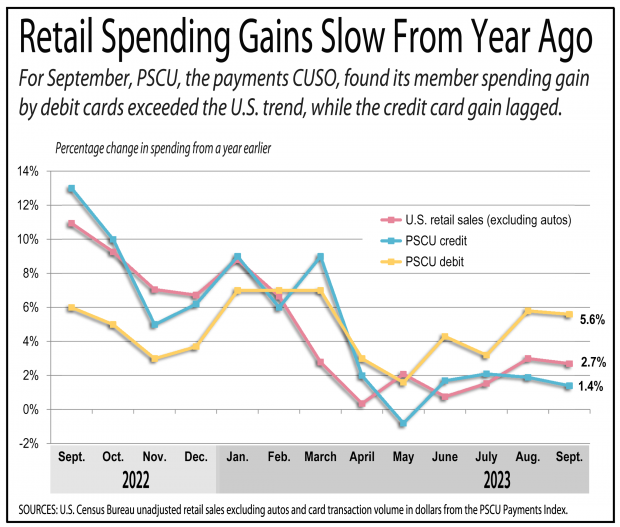
Retail spending slowed in September among all U.S. consumers and a sample of credit union members spending via debit and credit cards.
The U.S. Census Bureau reported Tuesday that seasonally adjusted retail sales rose 0.7% from August to $704.9 billion in September, following a 0.8% gain in August.
Recommended For You
NAFCU Economist Noah Yosif said "the pace of growth as well as its pervasiveness across a majority of surveyed goods and services elevates concerns of a rebound in inflation, but also dispels the notion of a weakening consumer balance sheet."
 Noah Yosif
Noah Yosif Yosif said the gains might cause the Federal Open Market Committee (FOMC) to raise rates at its next two-day meetings ending Nov. 1 and Dec. 13, "but are more likely to result in the committee maintaining of the current fed funds rate for longer."
Census also reported Tuesday that unadjusted retail spending, excluding automobiles and parts, rose 2.7% in September from a year earlier, down from a 3% gain in August. The retail gains for August and September were smaller than 3.7% 12-month gain in the Consumer Price Index for both months.
The PSCU Payments Index report showed spending in September rose 1.4% by credit cards and rose 5.6% by debit cards compared with the year earlier among credit union members using services of the St. Petersburg, Fla., CUSO. Spending slowed from August, when purchases rose 1.9% by credit and 5.8% by debit.
The PSCU report bracketed Census on grocery store spending, but differed on spending for gasoline and restaurants:
- Grocery store spending rose 2.1% in September from a year earlier, Census reported. At PSCU, spending rose 2% by credit and rose 4% by debit.
- Gasoline spending fell -3.6% in September from a year earlier, Census reported. At PSCU, spending rose 1% by credit and rose 2% by debit.
- Spending at restaurants and bars rose 9.7% in September from a year earlier, Census reported. At PSCU, spending rose 6% by credit and rose 6% by debit.
PSCU's average credit card balance was $3,001 in September 2023, down from $3,003 in August and up 7.3%, or $204, from $2,797 a year earlier.
PSCU's total credit card balances grew 11.6% in the 12 months ending Sept. 30. In the 12 months ending Aug. 31, PSCU credit card balances grew 12.2%, while the Fed's G-19 Consumer Credit report released Oct. 6 showed growth of 13.9% for credit unions and 11.2% for banks.
At Co-op Solutions, a payments CUSO based in Rancho Cucamonga, Calif., member balances grew by 12.6% in the 12 months ending Aug. 31.
Co-op Solutions balances rose 14.2% from September 2022 to September 2023, including a 2.8% jump from August to September. Average balance growth month-over-month in 2023 through September is 1.25% against .99% for the first nine months of 2022.
The delinquency rate among PSCU member credit card balances was 2.23% as of Sept. 30, compared with 1.74% a year earlier, 2.11% in August and 1.91% in 2019.
NCUA data for September won't be available until early December, but over the previous six quarters PSCU credit card delinquency rates have ranged from 35 to 50 basis points higher than the average for all credit unions, but were following the same upward direction. The latest comparison is for June 30, when the delinquency rate was 1.94% for PSCU members, up 40 bps from a year earlier, and 1.54% for all credit unions, up 47 bps from a year earlier.
The PSCU Payments Index was based on data from credit unions that have been processing payments with PSCU since January 2021. It encompassed 2.8 billion transactions valued at $142 billion of credit and debit card activity in the 12 months ending Sept. 30.
© 2025 ALM Global, LLC, All Rights Reserved. Request academic re-use from www.copyright.com. All other uses, submit a request to [email protected]. For more information visit Asset & Logo Licensing.








